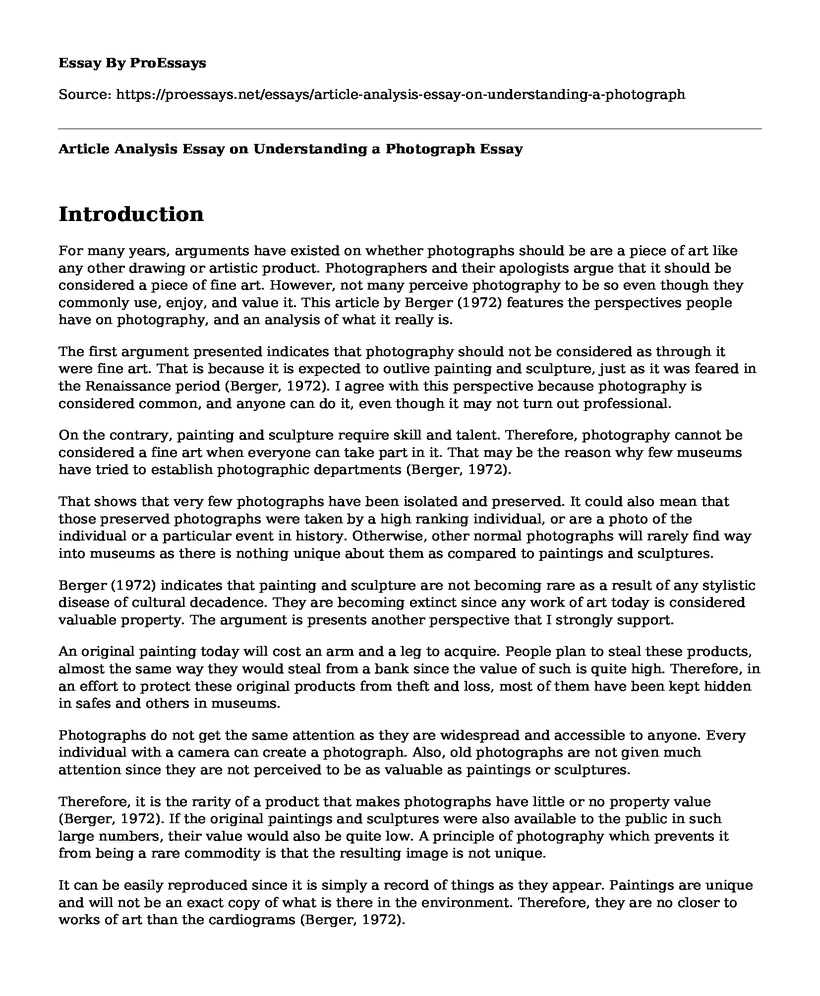Introduction
For many years, arguments have existed on whether photographs should be are a piece of art like any other drawing or artistic product. Photographers and their apologists argue that it should be considered a piece of fine art. However, not many perceive photography to be so even though they commonly use, enjoy, and value it. This article by Berger (1972) features the perspectives people have on photography, and an analysis of what it really is.
The first argument presented indicates that photography should not be considered as through it were fine art. That is because it is expected to outlive painting and sculpture, just as it was feared in the Renaissance period (Berger, 1972). I agree with this perspective because photography is considered common, and anyone can do it, even though it may not turn out professional.
On the contrary, painting and sculpture require skill and talent. Therefore, photography cannot be considered a fine art when everyone can take part in it. That may be the reason why few museums have tried to establish photographic departments (Berger, 1972).
That shows that very few photographs have been isolated and preserved. It could also mean that those preserved photographs were taken by a high ranking individual, or are a photo of the individual or a particular event in history. Otherwise, other normal photographs will rarely find way into museums as there is nothing unique about them as compared to paintings and sculptures.
Berger (1972) indicates that painting and sculpture are not becoming rare as a result of any stylistic disease of cultural decadence. They are becoming extinct since any work of art today is considered valuable property. The argument is presents another perspective that I strongly support.
An original painting today will cost an arm and a leg to acquire. People plan to steal these products, almost the same way they would steal from a bank since the value of such is quite high. Therefore, in an effort to protect these original products from theft and loss, most of them have been kept hidden in safes and others in museums.
Photographs do not get the same attention as they are widespread and accessible to anyone. Every individual with a camera can create a photograph. Also, old photographs are not given much attention since they are not perceived to be as valuable as paintings or sculptures.
Therefore, it is the rarity of a product that makes photographs have little or no property value (Berger, 1972). If the original paintings and sculptures were also available to the public in such large numbers, their value would also be quite low. A principle of photography which prevents it from being a rare commodity is that the resulting image is not unique.
It can be easily reproduced since it is simply a record of things as they appear. Paintings are unique and will not be an exact copy of what is there in the environment. Therefore, they are no closer to works of art than the cardiograms (Berger, 1972).
Therefore, the process of creation does not necessarily make a product a piece of art. It makes more sense to categorize products based on their resulting social function as property. Hence, photographs which do not have any property value do not qualify to be considered as pieces of art.
Berger (1972) argues that photography is based on a human choice to record a particular event or situation. Therefore, it does not celebrate an event or the faculty of sight itself. This presents an argument which I differ with. I do not agree with the view that photography is simply a choice made by human beings and not a celebration of events.
It is because most of the situations that are photographed feature specific events like marriage, graduation, vacations and so on. All these represents the events which individuals want to remember in future. They are choosing to record a particular instance so that in future, they can look back and tell a story about that day or sight.
Also, I believe paintings and sculptures are also based on human choice. The artists felt compelled to make a particular painting or sculpture, just as a photographer felt the need to record a particular event. Therefore, this cannot be a distinctive factor between pieces of art and what is not. Everything is based on human choice as it gives someone the will to do it.
Conclusion
In conclusion, a photograph is quite different from a piece of art, mainly because of how it lacks property value. It is widespread, and anyone can reproduce a photograph. The same cannot be achieved for paintings and sculptures, which is why these have a high property value that leads to their analysis. A piece of art, therefore, is anything unique that cannot be easily reproduced. Otherwise, it simply loses its rarity value which makes it possible for anyone to acquire a product of similar quality.
Reference
Berger, J. (1972). Understanding a photograph. Retrieved from https://static1.squarespace.com/static/54c6a9dde4b0908825a17018/t/5b8c0f71cd8366d4a0168eb7/1535905649559/JohnBerger-Understanding+a+photograph.pdf
Cite this page
Article Analysis Essay on Understanding a Photograph. (2023, Apr 01). Retrieved from https://proessays.net/essays/article-analysis-essay-on-understanding-a-photograph
If you are the original author of this essay and no longer wish to have it published on the ProEssays website, please click below to request its removal:
- Aristophanes' Criticism of the Art of Sophistry
- The Role of Music in Life Essay Example
- Power Struggles in The Tempest Essay
- The Grapes of Wrath Play Analysis Paper Example
- Essay on Hip Hop Music: Uncovering Root Causes of Racial Inequality and Proposing Solutions
- Essay Example on Risks of Social Media: Politics, Adolescents, and Online Dating
- Essay Sample on White Rappers: Guests in the House of Hip-Hop







